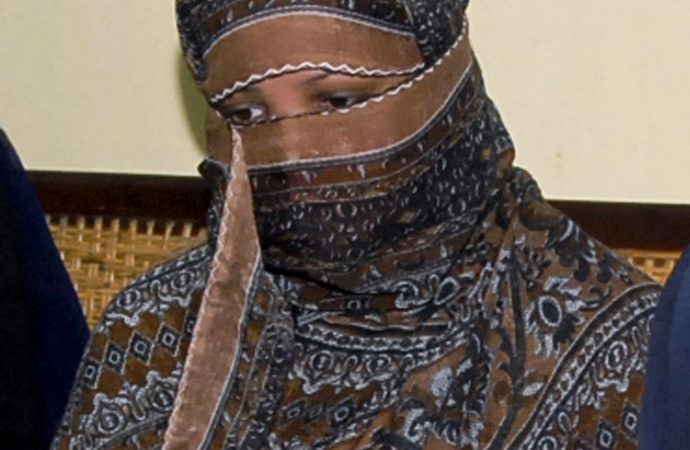Asia Bibi, the Pakistani Christian woman released earlier this year after a decade on death row facing blasphemy charges, has broken her silence, expressing gratitude for an international campaign to free her as well as regret for those still behind bars under Pakistan’s blasphemy laws.
“My whole life suffered, my children suffered and this had a huge impact on my life,” she said in a series of voice messages in response to questions posed by The Telegraph.
The former farm laborer was sentenced to death in 2010 after being accused of blasphemy in a dispute with Muslim women in her village over a cup of water. Two Pakistani politicians, including the country’s lone Christian cabinet member, were killed for publicly supporting her and criticizing the blasphemy laws.
“Sometimes I was so disappointed and losing courage … I used to wonder whether I would get out of jail or not, what would happen next, whether I would remain here all my life,” Bibi said.
“When my daughters visited me in jail, I never cried in front of them, but when they went after meeting me in jail, I used to cry alone filled with pain and grief. I used to think about them all the time, how they are living,” she said.
Bibi’s case drew support from Pope Francis and Christian organizations around the world. Last October, Pakistan’s Supreme Court overturned her conviction, triggering violent protests and calls for the judges in the case to be killed.
She spent several months in legal limbo, living under protective custody while negotiations were underway to find her and her family a new home. Bibi’s daughters moved to Canada earlier this year, and she arrived in May after leaving Pakistan secretly.
According to the London-based newspaper, even though Bibi is “enthusiastically grateful” for the efforts put into releasing her, “she says the world should know that Pakistan’s harsh blasphemy laws have left many others still behind bars.”
She also spoke of her heartbreak at being forced to leave her homeland, amid fears she would be murdered by religious extremists.
Her freedom was finally secured via mediation by a European Union special envoy named Jan Figel, a Slovak politician who also spoke with The Telegraph, revealing some aspects of the negotiations.
“I think [Prime Minister] Imran Khan’s government and Pakistan’s military used the delay to get the situation in the country under real control,” Figel said.
He held talks in Brussels with Pakistan’s attorney general, Anwar Khan, and Human Rights minister, Shireen Mazari. After Bibi’s release but before her departure, she and her husband Ashiq Masih were kept in government safe houses. While given a television and a smartphone, they were unable to venture outside.
Bibi said she’s hoping to move to a European country in coming months. During the interview, she thanked Pakistan’s Supreme Court for acquitting her, but said others also needed fair trials.
“There are many other cases where the accused are lying in jail for years and their decision should also be done on merit,” she said. “The world should listen to them.”
“I request the whole world to pay attention to this issue,” Bibi said. “The way any person is alleged of blasphemy without any proper investigation without any proper proof, that should be noticed. This blasphemy law should be reviewed and there should be proper investigation mechanisms while applying this law. We should not consider anyone sinful for this act without any proof.”
According to the U.S. State Department, there are currently 77 people imprisoned in Pakistan under blasphemy laws, most Muslims. In addition, most of those accused of blasphemy don’t actually make it to jail, but are killed by mobs.
According to Paul Bhatti the brother of Shahbaz Bhatti, killed for publicly defending Bibi and condemning the blasphemy laws, simply overturning this law is not enough.
“Many are killed by a mob after they’re declared innocent, and others are stoned even before charges are officially pressed,” he said.
“We have to change the strategy, get more involved in the government, yes, but also promote dialogue among religious leaders, make it clear that we don’t want to hurt any religious minorities but instead honor all the human values and the value of all human lives,” he said in an interview with Crux in July.
Despite the hardships, Bibi expressed sadness that she had to flee without even saying goodbye to her father.
“My heart was broken when I left that way, without meeting my family. Pakistan is my country, Pakistan is my homeland, I love my country, I love my soil,” she said.

